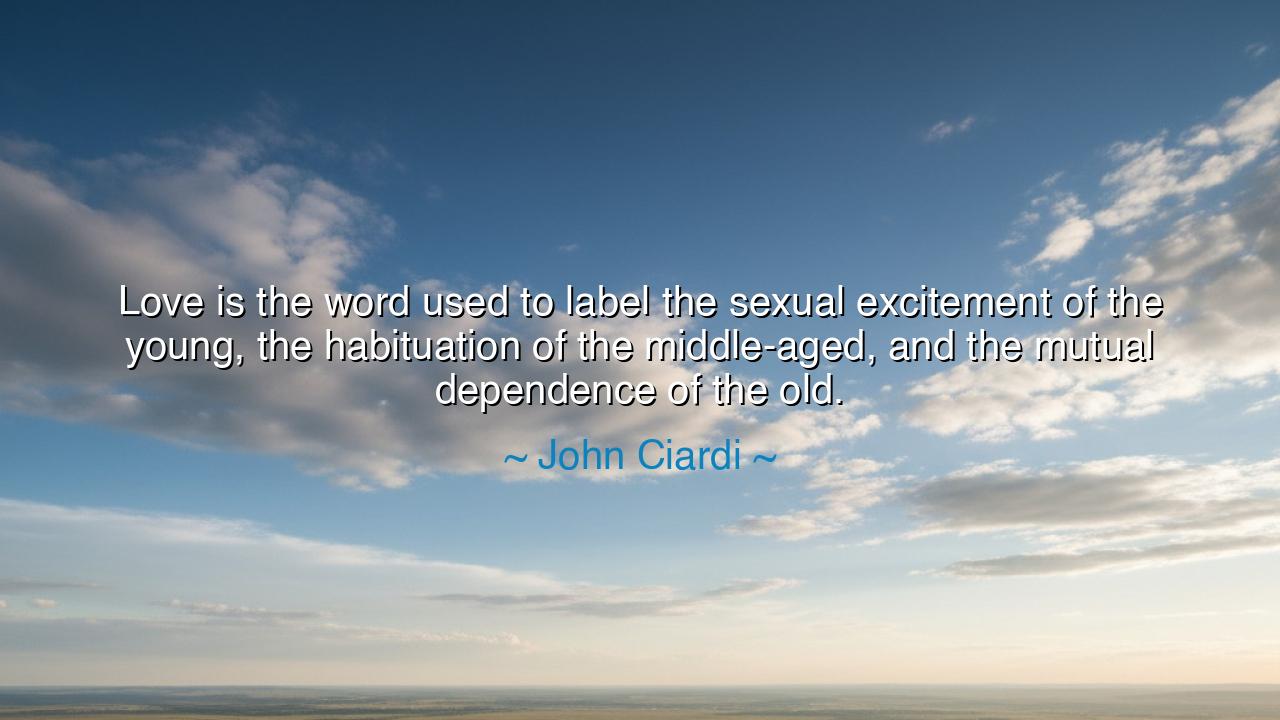
Love is the word used to label the sexual excitement of the
Love is the word used to label the sexual excitement of the young, the habituation of the middle-aged, and the mutual dependence of the old.






“Love is the word used to label the sexual excitement of the young, the habituation of the middle-aged, and the mutual dependence of the old.” – John Ciardi
Thus spoke John Ciardi, poet and philosopher of human nature, whose sharp wit often carried the weight of ancient wisdom. In this quote, he unveils a truth both sobering and profound: that love is not one constant thing, but a force that changes with time, evolving as we ourselves evolve. What begins as passion in youth matures into companionship, and in the twilight of life, becomes the sacred bond of interdependence — the quiet heartbeat of survival. In these few lines, Ciardi captures the three ages of love, each stage revealing not a decline, but a transformation — from flame to ember, from desire to devotion, from ecstasy to endurance.
When Ciardi speaks of the “sexual excitement of the young,” he evokes the first awakening of love — the electric rush of attraction that blinds the senses and ignites the imagination. Youth believes love to be eternal because it burns so brightly. It is the age of discovery, where two souls meet not only to embrace each other, but to learn the depths of their own longing. Yet this kind of love, though passionate, is fragile — for it feeds on beauty, novelty, and fire. Like spring blossoms, it dazzles the world for a moment, but it cannot remain unchanged under the weight of time. Still, without that first fever, no one would ever learn to feel at all.
As the years pass, love becomes something quieter — what Ciardi calls the “habituation of the middle-aged.” Here, love no longer burns; it glows. The lovers have seen each other’s weaknesses and learned to live within the ordinary rhythm of shared life. Passion gives way to patience, excitement to understanding. The middle-aged love not because it is thrilling, but because it is familiar, like the steady pulse of a drum that keeps the music of life in time. To the young, this stage may seem dull, but to those who live it, it is where love begins to prove its strength — not in ecstasy, but in endurance.
Then comes the final transformation, the “mutual dependence of the old.” Here, love becomes something sacred, stripped of all pretense. The bodies may weaken, but the souls draw closer than ever before. This love is not of desire, but of devotion. It is two lives that have weathered storms and seasons, that know each other’s silences and remember each other’s laughter. It is no longer about possession or pleasure, but survival — the shared breath that keeps loneliness at bay. In this stage, love has transcended itself; it becomes less about what one feels, and more about what one is.
The origin of Ciardi’s insight lies in his understanding of both poetry and human psychology. A student of life’s language, he saw that every word carries layers of meaning shaped by time. So too with love — its name remains the same, but its nature changes as we do. His observation is not cynical, but compassionate. He saw that love, far from dying, adapts — it reshapes itself to meet the soul’s needs at every age. Just as a river deepens as it flows, love matures as it moves through the landscape of human life.
History itself bears witness to this truth. Consider the story of Franklin and Eleanor Roosevelt. In their youth, their marriage was marked by energy and ambition — the excitement of building a shared dream. In middle age, they faced betrayal, illness, and distance, yet they remained bound by purpose and duty. In old age, though their relationship was no longer romantic, it became something deeper — a partnership of loyalty and mutual reliance. Theirs was not the love of youth’s passion, but of life’s perseverance. And in that endurance lay its greatness.
So, my listener, take this lesson to heart: love does not die; it transforms. Do not lament when passion fades, for it is only changing shape. Each stage of love demands its own kind of courage. In youth, the courage to risk; in middle age, the courage to remain; in old age, the courage to depend and to let go. The wise do not chase the fire of the beginning, but honor the warmth that remains.
For Ciardi’s words remind us of this eternal truth — that love is life’s reflection, always moving, always evolving, always human. It is the force that teaches us to feel, to stay, and to endure. And though it wears a different face in every season, it remains — unbroken, unnamed, and infinite — the pulse that binds all hearts beneath the changing sky.






AAdministratorAdministrator
Welcome, honored guests. Please leave a comment, we will respond soon